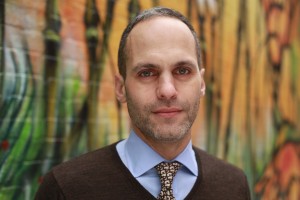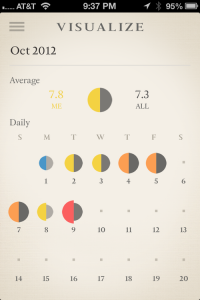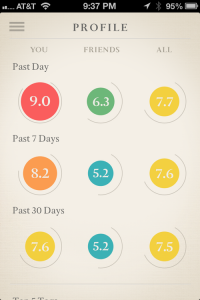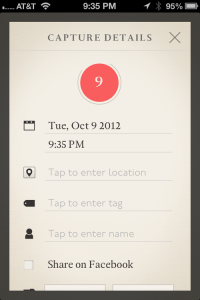Toolmaker Talk: Jonathan Cohen (Expereal)
Ernesto Ramirez
October 16, 2012
 “How do you feel right now?” Such a short question can lead us toward profound insights into our lives. But how do we ask ourselves that question? How do we keep track of our answers? There are many different ideas out there about how to tackle this seemingly simple question. Many of them focus on mood, which we’ve covered in previous Toolmaker Talks (see our posts about Happiness and Mood Panda). We’re going to explore another idea in his week’s Toolmaker Talk with Jonathan Cohen, the man behind the new (and soon to be released) app, Expereal.
“How do you feel right now?” Such a short question can lead us toward profound insights into our lives. But how do we ask ourselves that question? How do we keep track of our answers? There are many different ideas out there about how to tackle this seemingly simple question. Many of them focus on mood, which we’ve covered in previous Toolmaker Talks (see our posts about Happiness and Mood Panda). We’re going to explore another idea in his week’s Toolmaker Talk with Jonathan Cohen, the man behind the new (and soon to be released) app, Expereal.
Q: How do you describe Expereal? What is it?
Jonathan: Expereal is a simple iPhone app that allows people to rate, analyze, share and compare their lives. It was created to help people better understand their lives holistically, answering a most human question that cognitive biases can distort: “How’s my life going now relative to other time periods, friends and other users around the world?” In order to arrive at an answer, the app requires active participation, which it prompts via push messages (which can be turned off), requiring users to consistently rate their lives over time. Though it is unclear of whether millions of users care to actively measure their life, I went this route as a minimal viable product, because I was unconvinced of passive measurement’s efficacy, which crashes on the rocks of language interpretation and context.
Q: What’s the backstory? What led to it?
Jonathan: I read Daniel Kahneman’s book “Thinking, Fast and Slow,” which outlined the duality and inconsistencies in the experiencing and remembering selves. I wondered if there might be some value in capturing the subjective opinion of the experiencing self over time to counterbalance the remembering self’s so-called “peak-end bias.” What I found quite interesting was that the peak end bias doesn’t only affect our view of past events; it also influences how we think of our lives holistically in the present tense. Imagine walking out of a terrible meeting in which your boss publicly reprimanded you for incompetence, and someone asks how your life is going. How would our answer be influenced? Would that answer accurately reflect our perceptions across a wider swath of time? It is unlikely, as the preceding moment would act as an “anchor” in assessing our present moment lives.
From what I can discern, Kahneman doesn’t necessarily argue that the remembering self is “wrong” per se; he merely illuminates that it inaccurately captures the experiencing self. In his book and TED talk, he slyly asks the rhetorical question if we had to plan a vacation, would we plan it to satisfy our experiencing or remembering selves? In any cae, I thought that it would be valuable to have a more holistic perspective on my life that offered an alternate, longitudinal vantage point than what the ever-present peak end bias might offer. Furthermore, I hoped that such information might help me “know myself better” and potentially make better decisions. I then wondered if others had similar questions and desires.
Q: What impact has it had? What have you heard from users?
Jonathan: The app is in alpha testing. I have received a range of feedback – some quite positive (about the design and the app’s social nature) and some quite negative (“It’s not very useful for me. It takes a lot for me to really think about my mood, not just a 1-10 rating.” as well as “What exactly am I rating 1-10?”) The strongest critique, which strikes at the app’s very viability as a product and business, is that most people are not really that interested in measuring themselves, particularly actively over time. Consequently, Expereal needs to offer something immediate and compelling to encourage people to interact with the app. What’s the immediate feedback that makes it both useful and “sticky”?
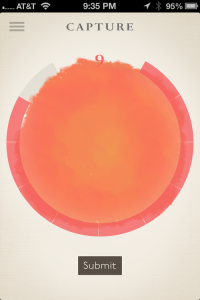
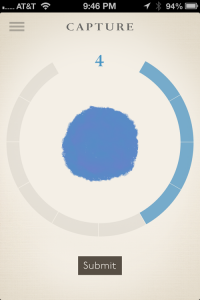
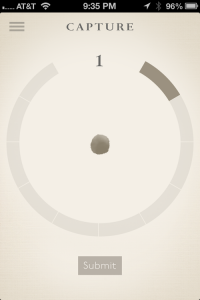
Q: What makes it different, sets it apart?
Jonathan: Simplicity: I created the initial capture mechanism to be dead simple: “How’s your life going right now? 1-10.” If the user has to think about it, he’s overthinking. It wasn’t intended to measure “mood”, though it could be used as such. The Capture Details screen is totally optional, allowing additional information to be ascribed to a rating.
Aesthetics: Expereal was designed to look different from other apps, not so simple given that there are several hundred thousand. I was most inspired by the LACMA exhibition catalog “Living in a Modern Way: California Design 1930-1965” and, to a slightly lesser extent, Edward Tufte’s data visualization books. I also respect the work of numerous “quantified selfers”, “data visualizationalists” and artists, including Jonathan Harris, Nicholas Felton, Jer Thorp, Jan Willem Tulp and countless others – many of whom consistently speak at the Eyeo Festival.
Social: I initially wanted to make the app solitary, because I was concerned that sharing one’s Expereal Ratings with friends would skew results, where users would only rate their lives when they were going well. I ended up taking a middle course: one can optionally share an Expereal Rating to Facebook, and one’s ratings and descriptions are used in anonymous aggregates. It could become more social depending on audience demand, but I want Expereal to remain true its core of helping users better understand their lives. It’s not meant to be another social network or to replicate Facebook, Path or Twitter, which could all be future partners.
Q: What are you doing next? How do you see Expereal evolving?
Jonathan: Expereal should be available in the app store in November. I have numerous ideas and dreams, but it will ultimately depend on user interest. Again, the core challenge is giving people who haven’t shown interest in active measurement inspiration to continually engage. I suspect that for most potential users, the social component will be a greater driver of interest and usage than advanced personal analytics, but am happy to be proven wrong and will adapt accordingly.
Q: Anything else you’d like to say?
Jonathan: Going from an idea to an app is an incredible challenge, yet even after it “ships”, it feels like the beginning of infinity. There are just so many possible permutations and extensions of what might happen. In another chapter of “Thinking,” Kahneman wonders why so many people start businesses without considering the terrible odds against succeeding. Right now, without question, I feel that it’s been a worthwhile endeavor. I’d give my life right now a ‘9’, describing it “rewarding”, “exciting” and “harrowing.” I love a challenge
Product: Expereal
Website: www.expereal.com
Price: Initial version – Free; Download for iOS
This is the 17th post in the “Toolmaker Talks” series. The QS blog features intrepid self-quantifiers and their stories: what did they do? how did they do it? and what have they learned? In Toolmaker Talks we hear from QS enablers, those observing this QS activity and developing self-quantifying tools: what needs have they observed? what tools have they developed in response? and what have they learned from users’ experiences? If you are a “toolmaker” and want to participate in this series, contact Rajiv Mehta at or Ernesto Ramirez.

